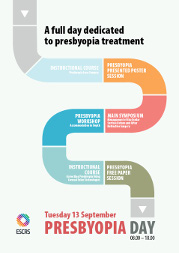Posters
Scleral hyperemia after retinal detachment surgery: could it be infectious scleritis?
Poster Details
First Author: E. del Fresno-Valencia SPAIN
Co Author(s): J. Suarez-Baraza C. Navarro-Perea L. Hernandez-Pereira J. Sambricio M. Mancheno-Losa
Abstract Details
Purpose:
To show the importance of taking into account the infectious etiologies in the differential diagnosis for all patients with scleral hyperemia.
Setting:
12 de Octubre Hospital, Madrid (Spain)
Methods:
Description of a clinical case: A 71 year-old woman is referred to our institution for conjunctivitis in OD which had started 3 months ago. She reported a retinal detachment surgery and cataract surgery in OD 6 years ago.
The right eye was very painful and injected and had not responded to prescribed treatments. Her visual acuity was hand motion in OD. She had conjunctival hyperemia in inferior nasal quadrant, scleral buckle extrusion and an anterior chamber reaction of 3+. Ultrasonography showed a posterior and inferior scleral thickening. Microbiology results demonstrated isolation of Pseudomonas Aeruginosa.
Results:
The diagnosis of infectious Pseudomonas scleritis was made.The patient was operated for scleral buckle removal and was treated with intravenous ciprofloxacin and systemic corticosteroids. In addition, she started topical treatment with moxifloxacin and dexamethasone.
After two months of treatment and periodic hospital appointments, pain and redness disappeared and visual acuity improved to counting fingers. Her retina remained fully re-attached, but an inferior region of retina with residual lipid exudates was found.
Conclusions:
infectious scleritis is a very rare pathology, but it could be devastating. Therefore, it is critical for ophthalmologists to maintain infectious etiologies in their differential diagnosis for all patients with scleral hyperemia and ocular pain, especially in patients with a history of ocular trauma or surgery.
Financial Disclosure:
NONE





